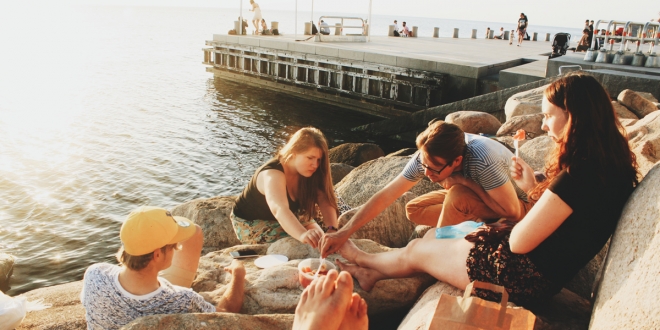There’s an old saying about Malmö: If you’ve seen Malmö, you’ve seen the world. Malmö is an international city, and its newly-certified University is an international university, with two-thirds of its students being non-Swedish. But what brought them to Malmö, and how do they like living in Sweden’s third largest city?
Why did you come to Malmö?
All EU residents are entitled to study tuition-free at Swedish universities, and this policy, combined with the amount of classes in English, brings students from all over Europe to Malmö. Some, like Linda Brunelli, come because they want a change from their home country: “Sweden was the opposite of Italy,” Linda Brunelli said, “it’s such a different culture than where I come from.”
Others choose Sweden because it’s close to home, like Mads Dethlefsen, a Dane who came to Malmö to study European Studies. He says he’s comforted by the proximity of his Copenhagen family and friends, only a short train ride over the Öresund away.
Do you like Malmö?
Malmö’s official motto is Mångfald, Möten, Möjligheter (in English: Diversity, Meetings, Possibilities), and the city has certainly earned it: nearly half of Malmö’s population is foreign born, and there are more than 170 nationalities represented in Malmö. Many of Malmö’s international students praise the city’s international atmosphere.
“Malmö is special because there are so many international people here,” says Mads Dethlefsen. “It’s like many cities in one.”
He also says he likes studying in a metropolitan city, and noted that if Malmö was in his native Denmark it would be the country’s second most populous city (it’s Sweden’s third).
But not everyone is so taken with Malmö’s size. “I want to be able to go clubbing on a Tuesday, and you can’t do that in Malmö,” says Anna Schneider, a German national; “Malmö feels smaller than it is.”
Some of the international students had not been drawn to Malmö so much as they had been drawn to Sweden and happened to end up in Malmö.
One such person is Ilona Karppinen, from Finland, who had indulged her dream of living abroad when she accepted her offer of admission to a Swedish university – only, it wasn’t Malmö University. She had originally joined another Swedish university’s Social Work program only to have the program be cancelled before beginning, forcing her to re-register at Malmö University. But she is happy here:
“The day I got the keys to my apartment [in Malmö] I thought: ‘this is home.’ ”
Ilona Karppinen, who has lived in Malmö for nearly two years, also praised the style of life in Sweden:
“I like Sweden because things are simple, and they work.” She cited IKEA as an example of function and simplicity. “Swedes don’t want to make things hard, Swedes wants to make things easy, and be happy.”
But that begs the question: is Malmö a fair representation of Sweden?
“Malmö may be a bit of a bubble,” Ilona Karppinen concedes, “I don’t know, I haven’t been to many other places in Sweden.”
Elif Ağar, a Turkish national on exchange from İstanbul Kültür Üniversitesi, chose to come to Malmö because she wanted to study in the Swedish system and experience the lifestyle. She’s travelled a fair amount around Sweden, and says “as a city, I think Malmö is Swedish. There are many migrants, but they integrate.”
Does Malmö like you?
According to the international students, Malmö has, for the most part, been welcoming to them, but many also said they tended to create social networks with other international students because it was difficult to make close Swedish friends.
Despite this, Elif Ağar, who says most of her friends are from continental Europe, decided to extend her exchange an extra semester. “I feel Turkish, of course,” she says, “but I also somehow feel Swedish.” She likes Sweden’s individualist social norms, and how Swedish people seem to mind their own business, and not gossip.
This individualism can sometimes give non-Swedes the impression that Swedes are cold or distant, but that’s not how Ilona Karppinen sees it. She says Swedes are much sunnier than Finns, citing a Finnish dictum which states that “one who is happy should not show it.” She is also dating a Swede, which she thinks has helped her integrate into Swedish society.
Tatu Pekkarinen, also from Finland, said “the only thing not welcoming about Malmö was the bureaucracy. Whenever I go to Skatteverket [Sweden’s tax authority] I feel I’ve done something wrong. The people are friendly, but some of the national institutions aren’t so welcoming.”






